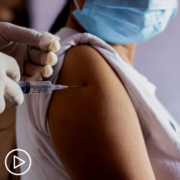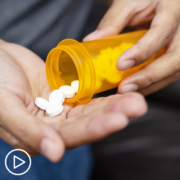What Should Follicular Lymphoma Patients Know About Remission?
What Should Follicular Lymphoma Patients Know About Remission? from Patient Empowerment Network on Vimeo.
What does follicular lymphoma remission mean, and what should patients know about it? Expert Dr. Kami Maddocks from The Ohio State University explains remission, functional cure, and immunosuppression.
See More from START HERE Follicular Lymphoma
Related Resources:

|

|

|
Transcript:
Lisa Hatfield:
This patient is asking if you are in remission for a long period of time after follicular lymphoma treatment, can you technically be cured in some cases, or are you considered to still have the cancer?
Dr. Kami Maddocks:
So that is a great question. There’s a term that’s used in follicular lymphoma called a functional cure. So we have patients that essentially get treated, and they live long enough that they die from something else without their follicular lymphoma ever relapsing. So while we say from what we know if somebody lives long enough that this disease is likely going to relapse at some point, there are patients that will be treated, and the disease will never come back.
Lisa Hatfield:
Can patients facing follicular lymphoma be considered immunocompromised if they’re in remission?
Dr. Kami Maddocks:
I think this kind of goes back to when we talked about the immune system recovery that this can be a little bit of a complicated question, because it depends a little bit on the treatment that they got, how far out from the treatment they are and how many treatments they’ve had in the past. So, in general, if I have a patient that has received therapy, their counts have recovered, they in general look like…their lab work looks like their immune system, then in general I would say that they have an immune system that’s likely similar to somebody who didn’t have the follicular lymphoma, and they’re going to be able to fight infections and respond to vaccines.
I think what we do know is sometimes when patients get rituximab maintenance or obinutuzumab (Gazyva) maintenance or some of the chemotherapies there are some patients that can have a longer time that they’re immunosuppressed. So I think this is always something that’s good to ask your doctor for. In your specific situation with the treatment you received, when do you expect to have a regularly functioning immune system?
Share Your Feedback:
Create your own user feedback survey










